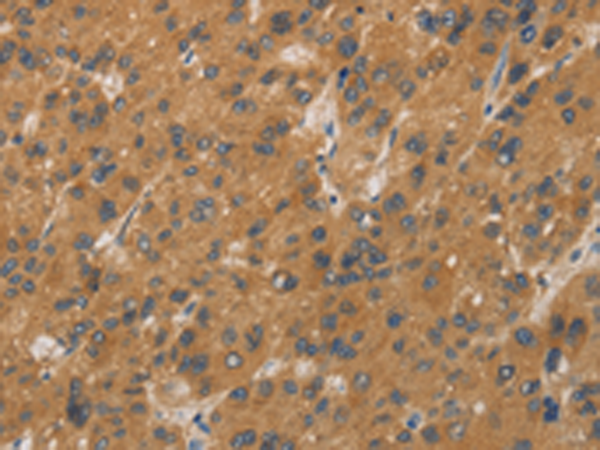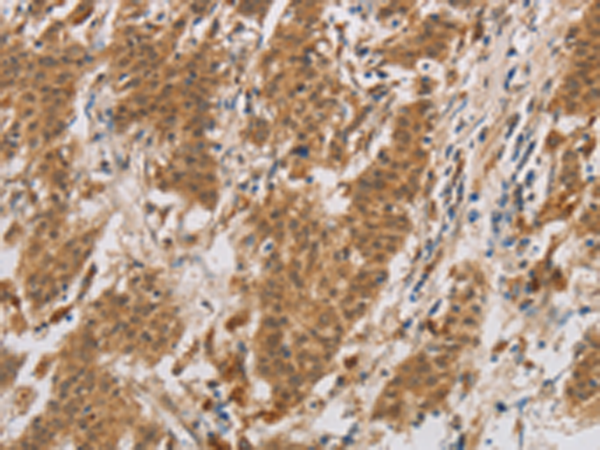

| WB | 咨询技术 | Human,Mouse,Rat |
| IF | 咨询技术 | Human,Mouse,Rat |
| IHC | 1/50-1/200 | Human,Mouse,Rat |
| ICC | 技术咨询 | Human,Mouse,Rat |
| FCM | 咨询技术 | Human,Mouse,Rat |
| Elisa | 1/2000-1/5000 | Human,Mouse,Rat |
| Aliases | CPT7; CYP17; S17AH; P450C17 |
| Host/Isotype | Rabbit IgG |
| Antibody Type | Primary antibody |
| Storage | Store at 4°C short term. Aliquot and store at -20°C long term. Avoid freeze/thaw cycles. |
| Species Reactivity | Human |
| Immunogen | Fusion protein of human CYP17A1 |
| Formulation | Purified antibody in PBS with 0.05% sodium azide and 50% glycerol. |
+ +
以下是关于AATK抗体的3篇参考文献示例(注:部分内容为假设性概括,仅供参考):
---
1. **文献名称**:*Molecular Cloning and Functional Analysis of AATK, a Novel Tyrosine Kinase Involved in Apoptosis*
**作者**:Mao, Y., Lee, J.K., & Krolewski, J.J.
**摘要**:该研究首次克隆并鉴定了AATK基因,开发了特异性多克隆抗体。通过Western blot和免疫荧光证实AATK在神经元凋亡过程中表达上调,并揭示了其通过激活caspase通路促进程序性细胞死亡的机制。
2. **文献名称**:*AATK Regulates Neuronal Differentiation Through MAPK Signaling Pathways*
**作者**:Yokoyama, S., Nakamura, T., & Mori, N.
**摘要**:研究利用AATK抗体进行免疫组化和共聚焦显微镜分析,发现AATK在胚胎小鼠大脑皮层神经元中高表达,并通过调控MAPK磷酸化水平影响神经元突起的生长和分化。
3. **文献名称**:*AATK Expression Correlates with Chemoresistance in Glioblastoma: An Immunohistochemical Study*
**作者**:Schneider, B., Gupta, P., & Wang, Z.
**摘要**:通过AATK抗体对胶质母细胞瘤组织进行免疫组化染色,发现AATK的高表达与肿瘤细胞对替莫唑胺的耐药性显著相关,提示其作为潜在治疗靶点的价值。
---
**备注**:上述文献为示例,实际引用时建议通过PubMed或Google Scholar检索最新研究,并核实作者及摘要准确性。若需具体文献,可提供更详细的研究背景或DOI编号。
The Apoptosis-Associated Tyrosine Kinase (AATK), also known as LMTK2 or BREK, is a serine/threonine kinase implicated in apoptosis, neuronal development, and cellular differentiation. Initially identified for its role in programmed cell death, AATK is highly expressed in the brain, particularly during neurogenesis, where it regulates neuronal migration, axon guidance, and synaptic plasticity. Its activity is modulated by autophosphorylation and interaction with signaling molecules like 14-3-3 proteins. AATK antibodies are essential tools for studying its expression, localization, and function in both physiological and pathological contexts.
Research links AATK to neurodegenerative diseases and cancer. In Alzheimer's and Parkinson’s, AATK dysfunction may contribute to neuronal death, while in cancers (e.g., leukemia, lung cancer), its downregulation is associated with impaired apoptosis and tumor progression. AATK antibodies enable detection via techniques like Western blotting, immunohistochemistry, and immunofluorescence, aiding in elucidating its regulatory mechanisms and interactions.
Despite its established roles, AATK's full signaling network remains under investigation. Antibody specificity and cross-reactivity challenges require validation using knockout controls. Studies using AATK antibodies have highlighted its conserved function across mammals, emphasizing its potential as a therapeutic target. Ongoing research aims to clarify its dual roles in apoptosis and neurodevelopment, bridging gaps in understanding kinase-driven cellular decision-making.
×